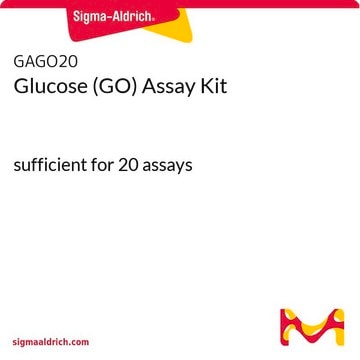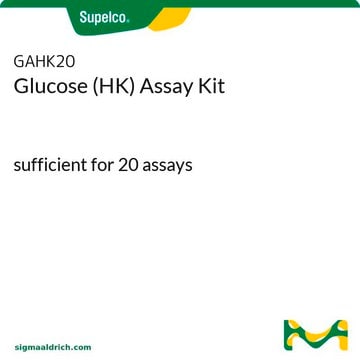MAK014
Glucose-6-Phosphate Assay Kit
sufficient for 100 colorimetric tests
About This Item
Productos recomendados
usage
sufficient for 100 colorimetric tests
detection method
colorimetric
relevant disease(s)
hematological disorder
storage temp.
−20°C
General description
Application
- glucose 6-phosphate (G6P) assay
- quantification of glucose-6-phosphate (G6P) and fructose-6-phosphate (F6P)
- metabolite analysis
Suitability
Principle
replaced by
signalword
Danger
hcodes
Hazard Classifications
Eye Dam. 1 - Resp. Sens. 1 - Skin Corr. 1B
Storage Class
8A - Combustible corrosive hazardous materials
Certificados de análisis (COA)
Busque Certificados de análisis (COA) introduciendo el número de lote del producto. Los números de lote se encuentran en la etiqueta del producto después de las palabras «Lot» o «Batch»
¿Ya tiene este producto?
Encuentre la documentación para los productos que ha comprado recientemente en la Biblioteca de documentos.
Artículos
Warburg effect enhances glucose to lactate conversion in tumor cells, regardless of oxygen levels; impacting cancer metabolism since 1924.
Warburg effect enhances glucose to lactate conversion in tumor cells, regardless of oxygen levels; impacting cancer metabolism since 1924.
Warburg effect enhances glucose to lactate conversion in tumor cells, regardless of oxygen levels; impacting cancer metabolism since 1924.
Warburg effect enhances glucose to lactate conversion in tumor cells, regardless of oxygen levels; impacting cancer metabolism since 1924.
Nuestro equipo de científicos tiene experiencia en todas las áreas de investigación: Ciencias de la vida, Ciencia de los materiales, Síntesis química, Cromatografía, Analítica y muchas otras.
Póngase en contacto con el Servicio técnico




